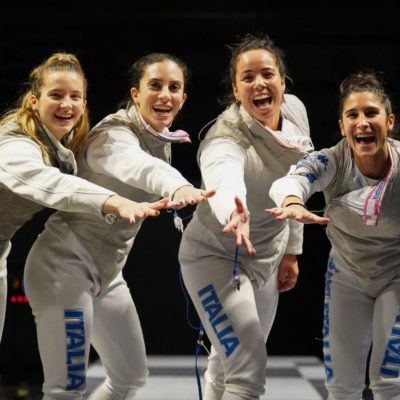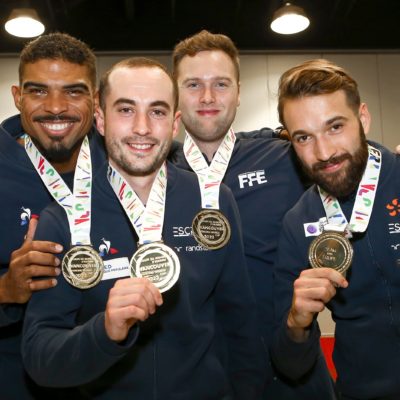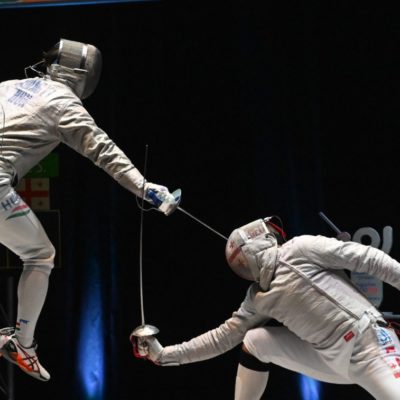 Mariel Zagunis, fresh off of competing in the US National Championships, caught us up with her season and what’s next for the US team between now and the Olympic Games.
Mariel Zagunis, fresh off of competing in the US National Championships, caught us up with her season and what’s next for the US team between now and the Olympic Games.
For those that think the US fencers can sit and rest up now that they’re in, think again because there’s still the 2nd half of the fencing season and it all counts towards seeding into the Olympic Games.
Listen in (or subscribe to our podcast on iTunes) as Mariel talks about being able to fence at home, upcoming travels, and how the FIE almost changed the game mid-season.
{audio}https://fencingnet.wpengine.com.s3.amazonaws.com/podcast/Zagunis20080429.mp3{/audio}
Photo courtesy Amy Timacheff – FencingPhotos.com
Discuss this interview on the forums. [link]
Transcript:
Harkins: Okay. This is Craig Harkins with fencing.net. And I’m speaking to Mariel Zagunis of the U.S. Women’s sabre team and current Olympic champion. So how are you doing today, Mariel?
Mariel Zagunis: I’m doing very well. Thank you.
Harkins: Good. So you just got to fence in the national championships in your hometown. How did that feel?
Mariel Zagunis: It felt really great. A lot of people, like a lot of my family and friends were able to make it out on Monday morning to come watch me. So it was a lot of fun. It was kind of weird just, you know, waking up in my own bed and going to fence in a competition ‘cause that never happens. But it was really fun. I had a great weekend.
Harkins: That’s good. You were in your own time zone, got to eat food you were used to.
Mariel Zagunis: Um-hmm.
Harkins: That doesn’t seem like a real fencing competition for you, does it?
Mariel Zagunis: No, it doesn’t at all. There’s no long flights to Europe or Asia to worry about or anything like that so-
Harkins: Well, that’s good. And so the Olympic qualifications are all set. The team is set now. The Olympic team’s been announced for all the weapons. So what is there now between now and August when the games start up?
Mariel Zagunis: There’s actually a lot left to our season. We did like the first half of the season. In February and March we went to like six tournaments. And I had most of April off except for this tournament. But we still have – I still have four more World Cups that I’m going to. So there’s still a lot to get done before Beijing.
Harkins: Okay. And those are for the – those are to keep the seedings for the Olympic tournament? Or what’s the impact of the rest of the World Cups?
Mariel Zagunis: That’s exactly what it is. It’s for your individual ranking. And also for the team ranking we have grand previews in Tianjin, China and Las Vegas. So those two team events will affect our team seeding. Even though I don’t think that much will change with the teams because we already have – I think we’re second and France is pretty far ahead of us. So I don’t think that we’re going to move into first or anything. But for our individual rankings it is important to get a high seeding prior to Beijing.
Harkins: Okay. And so you’re taking time off from Notre Dame to train this season, correct?
Mariel Zagunis: I am. I am. I’ve been off since the winter of 2006. So it’s been awhile that I’ve been home.
Harkins: What have you been – have you been doing anything keeping up with coursework or just letting that sit until after the Olympics? Or what’s the plan there?
Mariel Zagunis: I’ve basically just been focusing 100 percent on fencing. Just because with all the traveling and training that I had to – I had to do a lot of traveling and also catch up on a lot of training because when I was at school it was just way too hard to, you know, practice as hard and as long as I wanted to. So I figure since this is the Olympics, it only comes around every four years and I have a pretty big task ahead of me that I kind of want to give it 100 percent and not have thing else distracting me from that goal that I have right now. So I’m not taking any school work or anything.
Harkins: Okay. Well, when you come back to it, what are you focusing on?
Mariel Zagunis: Like my major?
Harkins: Yeah or what areas are you interested in. And what’s going to be that life in addition to or outside of fencing?
Mariel Zagunis: Right. That’s a hard question because so far my entire life has always been fencing. And so when it come to like thinking about the real world and my future and what I have do as like a career; it’s kind of hard to picture what I would do other than fencing ‘cause that’s all I’ve really been doing. But I kind of what to get into sports medicine or physical therapy or some field in that area because I still can be involved with like sports and athletes and stuff like that. And I’ve been there and that’s something I feel I can really relate to and I’m really interested in.
Harkins: I bet you’ve seen a lot of injuries close up with you and the rest of the team mates going through that-
Mariel Zagunis: Yeah. Yeah.
Harkins: The past several years.
Mariel Zagunis: I’ve had a lot of physical therapy on myself. So I kind of know the drill.
Harkins: So outside of your normal fencing training, there are always these discussions about what is the training besides fencing. And there’s some old school ideas that the only good training for fencing is fencing. What else do you do outside of fencing to maybe either break up the monotony or give you a different focus?
Mariel Zagunis: Yeah, I think that the old philosophy that the best training for fencing is fencing is not a very smart one. Because anyone who observes fencing or is a fencer themselves, knows how in balance that it makes your body. And so I think that cross training, especially when you’re at the high level, is very important to help prevent injuries. So for me, I just do – I do some running and some biometric stuff.
But to have more fun with it I like to take tennis lessons and stuff because like the quick feet movement and the hand eye coordination and the reaction time is kind of the same. So I mean, I play tennis but I don’t play it really to work on my tennis game but I play it to also condition but have fun while I’m doing it. So that’s one thing that I do differently, I think. I mean, that kind of helps keep me sane so I’m not stuck in a gym 24/7.
Harkins: Okay. And looking ahead you’ve got the rest of the regular season to give. But looking ahead to Beijing, you’re going in now as the veteran, as the Olympic champion. Whereas, last time you were a little bit of a surprise. I wouldn’t say that you were discounted but the focus was on a couple of other fencers going in. How are you – have you seen that pressure during the regular season and what are you doing about that?
Mariel Zagunis: Well, I definitely enjoyed my position a lot more going into the last Olympics for the very reason that you just said. And this time, ever since Athens I’ve always had to deal with that added pressure every single competition since then. Where people kind of expect me to win. Or if they beat me, if like someone beats me in a competition it’s all that more of a big deal to everybody else because they beat the Olympic champion and stuff.
But I just treated every competition the same. And you know, you win some and you lose some. And I’m going to try to deal with the added pressure as much as best as I can going into Beijing. And hopefully just fence my best and pull out another gold medal.
Harkins: Have you seen that your preliminary round bouts are a little bit tougher because they’re facing the Olympic champion?
Mariel Zagunis: Yes and no. Sometimes it just depends on who I’m fencing. Sometimes they’ll be so intimidated that like I won’t even do anything. Their coach will just say, guess who you’re going to fence now. And they just get so intimidated that it kind of makes it easier for me. But then for some other fencers, they’ll know who I am and just want to beat me all that much more. And it makes it harder for me. So it goes both ways.
Harkins: So it kind of depends on what their mental mindset is?
Mariel Zagunis: Exactly. And mine as well because, you know, you can’t have an on day all the time. You win some, you lose some.
Harkins: What’s been the biggest change in your training since Athens?
Mariel Zagunis: Biggest change? Well, I think going to school – I mean, it’s important for me to go to college and get a good education at Notre Dame and stuff like that. But from the fencing standpoint, I think it really hindered my training and really all my fencing in its totality. Because I was away from my coach and my club for two and a half years, only coming back for winter break and summer break. So I think it was really hard for me to adjust from going from, you know, being at the top of my game, the best fencing I’ve ever done at the Olympics to college fencing.
Where I don’t know if you’ve ever seen or watched college fencing but it’s just a completely different mindset, a completely different just way of approaching it. And the competitions are just a different format than I was ever used to and stuff like that. But I think that my training has changed because really my situation has changed. You know, I’ve had to come back a lot because I feel like I lost a lot when I went to school. So I’ve been working really hard with my coach to try and get back what I lost. But then at the same time, you know, a lot of the rules are changing in fencing these days with the timing being one thing.
And now, I don’t know if you’ve been keeping up with all these crazy changes that they’re making; but they are changing the definition of an attack. And like it’s all this – constantly evolving, not only for me personally but for fencing worldwide. And so everyone is always having to make changes. So I think that right now I’m trying to do everything that I was doing prior to Athens. Yet, at the same time, I have to do things a bit differently because it’s not the same type of fencing that Athens was.
Harkins: Now, I remember when there was a video released from the FIE arbetage committee, the referees that basically was saying low line attacks, if there’s a simultaneous in a low line and a high line that the low line attack is tossed out. And then a couple weeks later that was overturned. But that’s, with the style of some of the fencers out there, that would have significantly changed.
Mariel Zagunis: No, I mean that was just a disaster. Because that’s just one example of how they’re trying to change something. And they just kind of do it without taking into account, like you were going to say, like there were so many fencers who their exact style is to have a low line blade. And so, you know, that was just a ridiculous mess in my opinion because they decided to just throw that rule out during World Championships.
You know, and it was kind of a big obstacle for us to all overcome mentally because all of the sudden we had to start thinking about, you know, worrying about are we having our blade up or are we having it down. Are they going to call it? Are they going to not call it? So that’s just another challenge. I mean, luckily that rule didn’t stick around but they are still making some changes here and there that everyone has to adjust to. It’s kind of unfortunate but it’s just the way the sport goes, I’m afraid.
Harkins: How do you learn about those kinds of changes? Do your coaches keep an ear to the ground and then report back on what adjustments you need to make based upon what they may or may not be calling from tournament to tournament?
Mariel Zagunis: Well, I think by now in the World Cups they kind of are being as consistent as they can. But that tempo now that I’ve been working on, that new way that they’re calling the attacks and stuff; I’ve been working towards that. But then you go to a national competition, like we had this weekend, and U.S. referees and they don’t have that international experience. So they don’t see the changes that are being made.
And it’s kind of like – I’d say the biggest adjustment would be something in a national tournament versus an international tournament. Luckily I don’t do too many national tournaments. So I really only focus on the World Cups and what the international referees are going to call. But I think by now they’re pretty consistent.
Harkins: And how about the video refereeing, the video replaying? We’ve had that in place for a little while now. Is that been a useful tool?
Mariel Zagunis: I think video referring is great. Sometimes, I mean, you have to use it wisely because before like when we didn’t have video referring, arguing with the ref really wouldn’t get you anywhere. And now in a way it can if you do it in a polite manner. And they do actually look at the call and see that they had made a mistake. So I think that video referring is a great improvement upon fencing. And it can – I mean like referees are only human.
And the good ones make few mistakes but you know, it kind of helps them even if they’re not sure. You know, even if a fencer doesn’t challenge it; they are still able to re-watch the touch, which I think is important sometimes. Because – especially with sabre, it happens so fast that you can’t be ready for every single touch. So I think that it’s a very useful tool that we have now.
Harkins: Okay. So you’ve got a – getting ready for these next World Cups; what’s your next thing? Do you guys have a training camp coming up?
Mariel Zagunis: I’m actually leaving on Thursday for Austria. There’s a tournament in Klagenfurt. And then I’m coming home from that and we were going to have a World Cup in Vietnam. But it got cancelled. And so that was going to be one of our two week trips where we stay over in Asia and then go to a tournament in China. But since Vietnam is cancelled we’re just going to jet over to China for a weekend. And then come back and then it’s Cuba and Las Vegas. And then we have a training camp right before Beijing.
Harkins: That sounds good. Well, I wish you great luck-
Mariel Zagunis: Thank you.
Harkins: For the rest of the season, for both you and the team.
Mariel Zagunis: Thank you very much.
Harkins: And we’ll hope to see more success for you in Beijing.
Mariel Zagunis: Okay. Thank you.
Harkins: Okay. Thanks.
[End of Audio]





